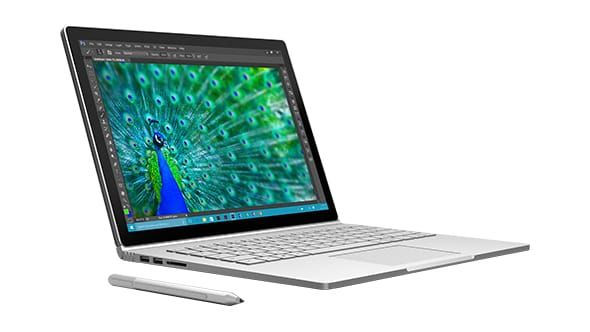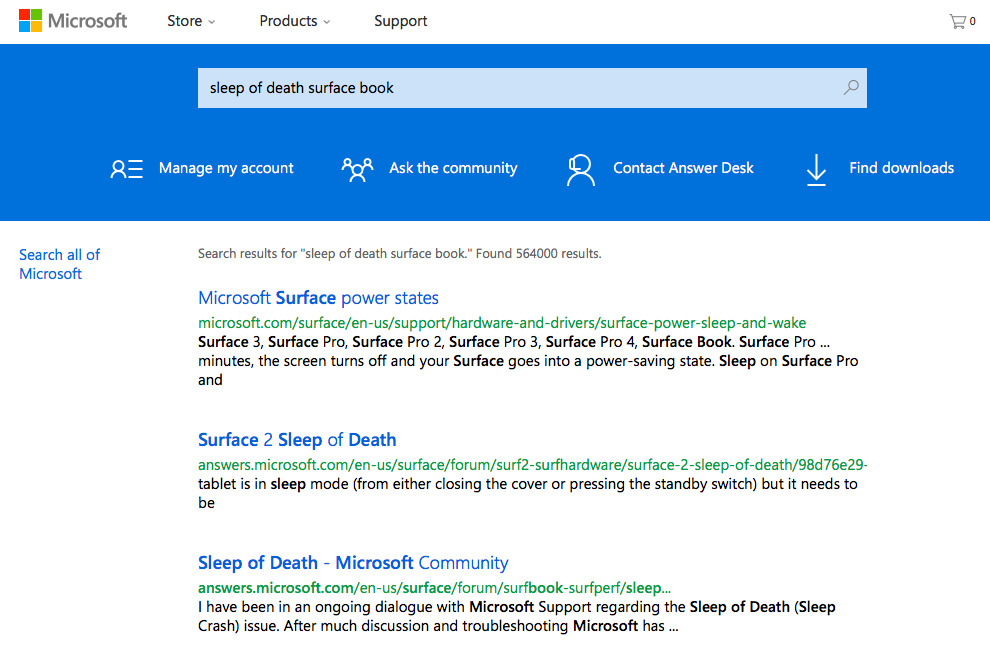Microsoft's pricey Surface Book laptop is frustrating buyers with crashes, "unplanned shutdowns," overheating issues and a "Sleep of Death" issue that regularly causes machines to become completely unresponsive during sleep. Users complain that Microsoft isn't addressing the problem.
Addison Snell, the chief executive of Intersect360 Research, wrote about his "nightmare" experience with a top of the line Surface Book he paid over $4,000 for, noting for The Register UK that Microsoft hasn't offered a solution and refused to replace or return his defective machine.
Surface Book is a premium priced, more conventional laptop with a detachable screen that Microsoft introduced last year alongside its fourth edition of the tablet-oriented Surface Pro 4.
"Whenever the system goes to sleep for a few hours or more, chances are it's not going to wake up," Snell wrote. "These long sleep periods, such as overnight, usually result in system crashes. The start of my work day, almost every day, involves bringing my Surface Book back from an unplanned full shutdown."
After three months of trying to find a solution for the Surface, he discovered the problem is so common it has a name: "Sleep of Death." Discussion site Reddit has 50 threads about the issue, and Microsoft's own support site returns over 75,000 results when searching for Surface Sleep of Death.
"A simpler search like 'Surface sleep crash' nets even more: 250,000," Snell wrote.
His initial three hour support call to Microsoft, made during the first week of ownership, involved providing a technician with remote control of his machine to perform updates and a reset of his power settings, but didn't fix the problem. Subsequent emails and even tweets to @SurfaceSupport resulted in no replies.
An online chat with Microsoft support was also unable to solve the problem, but when Snell asked for a refund, Microsoft noted that the purchase had now exceeded a 30 day window and that neither online support nor Microsoft Retail were capable of processing returns after that date.
Upon taking the defective Surface Book to a Microsoft Retail store, Snell wrote that his customer service experience as "was friendly and welcoming but immediately took the same stance of sympathetic ineptitude I got elsewhere: 'I'm feelin' you, bro. That sucks. I'm sorry I can't help you. The POS system just doesn't let us do it.'"
Common problem for Windows
Readers commented similar experiences, with one noting "I've had the [Surface Book] about 6 weeks now. As soon as I got it, I started having the Sleep of Death issues as discussed in the article. It did my head in that a $3000 laptop and this could happen."
Others commented that they'd experienced similar problems with previous Surface models, as well as other PC vendors' hardware, such as one HP Elitebook user who wrote "I have had this 'Sleep of Death' bug with Windows 8.1 multiple times, with [Windows] 10 it has also happened this morning. Definitely a Windows bug."
Another noted, "Apple is light years ahead of getting a laptop to resume from sleep using their OS compared to Windows or even any Linux distort I know of. You just have to watch any of their WWDC videos on the subject to see how much thought and work they put into it and getting it to work with newer Intel hardware. If Microsoft is doing the same I haven't heard of it."
The "Sleep of Death" name appears to take inspiration from "Red Ring of Death" hardware issues that plagued Microsoft's Xbox 360, a problem which itself was named after the "Blue Screen of Death" that Windows PCs used to display when they crashed.
iPad Pro also had a wake issue
Apple's new iPad Pro line, which also debuted last winter, exhibited a similar problem for some users where the unit might stop responding and need to be manually powered off. Apple addressed the issue in December's iOS 9.2 update.
In mid May, Apple subsequently released another update, iOS 9.3 which completely disabled iPad Pro models for some users, causing Apple to pull the update.
 Daniel Eran Dilger
Daniel Eran Dilger








-m.jpg)






 Brian Patterson
Brian Patterson
 Charles Martin
Charles Martin


 Malcolm Owen
Malcolm Owen
 William Gallagher
William Gallagher
 Christine McKee
Christine McKee
 Marko Zivkovic
Marko Zivkovic







56 Comments
Two phases came to mind when I saw POS.
I have a similar same problem with the POS Lenova Laptop I am forced to use at work. I have narrowed the problem down to it being an issue with the interrupt system in Windows. Basically its defective. What I do is make sure I never open the display , but only move the attached mouse or press a keyboard key to make the external display respond. Opening the laptop necessitates a complete hard reboot to get any response from the peripherals because experience (years of trial and error) has told me it thinks there are no peripherals attached when the display is opened up. Those buffoons at MS prolly are still using the desktop Windows kernel with the Surface and trying to get it to work with all that old crappy code. The windows memory Manager is a complete and utter mess of obfuscated code , read: It can't really unfrag its heap or anything else for that matter. Putting a windows system to sleep is akin to death.
I'd wager the kernal has "forgotten" where the cursor is after sleeping. I bet the memory manager has corrupted the cursor address and so on wake it can't figure out what to wake up freeze, or goes off to some address that leads to a freeze. Do you have peripherals attached.? It might be the same issue. In fact I have owned several pc laptops over the years and invariably they start exhibiting this behavior.
I don't know why it is I guess it has to do with crappy HW quality and the kernal Windshit OS. Its hard to believe that MS can still not fix such elementary things like this work. Oh wait, I'm not really THAT surprised there is minimal Quality Control or basic testing done at MSFT is there, we are beta testers duh. Bill Gates pitched us a POS
I'm looking very much forward to retiring in one year, so I will never ever ever ever have to use a Windows based computer again. Until then its just the one of many annoyances I have to deal with at the office.
This problem which is one of 1000's that Windows has is the reason why consumers are buying macs in droves and moving to mobile devices that actually work. If you think about it. I'm glad that Microsofts Mobile strategy is failing. At least they won't inflct any more damage on the more gullible users who might fall for their sales tactics!
I just love it when someone, knowing I'm a techy, asks me to fix some annoyance on their Windows machine and I reply "I stopped using PC's after XP . I moved to a mac, sorry I can't help you!". I never say , "you stupid fool- you shouldn't have bought that POS cheap garbage in the first place" that would be cruel, I let them figure it out the hard way for themselves- As the original idiot who bought into the surface hype did- I just think it. And he paid $4000 for it lol jeez what a bozo. I don't suppose he will be buying another Surface? HE WOULDN'T BE THAT STUPID WOULD HE?
AWWWWWWWWWWwwwwwwwwwwwwww! That's too bad.
They paid for a Mercedes but got a Chevy.
Today is 5/31/16. This device has been available for well over 6-8 months. These issues have widely reported for many months - long enough for Microsoft to completely resolve them. FWIW, almost all of the issues were related to Intel's Skylake processor.
Look, I read Apple Insider because I use Mac's (And Windows). Why the writers on the site seem to want to denigrate anything not Apple is ridiculous. Report on AAPL. If I want to read about MSFT, I'll go to Windows Central (Which, by the way, never mentions either AAPL or GOOG in a derogatory manner.). Grow up!